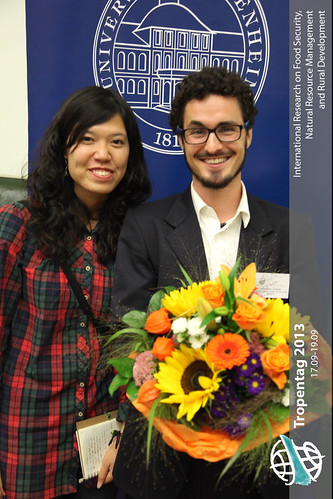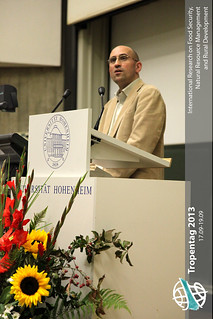Student Reporter 2013; Tropentag 2013
What do cauliflower in Bangladesh, groundnuts in South Africa and wild vegetables species in Nepal have in common?
Wed, 09/18/2013 - 18:00 — Kirstin Ohlendorf
… they all played an important role in the session on vegetable production within the rural-urban continuum, which not only offered insights into a lot of plant varieties, but also into a wide variety of topics from web based collaborative research between Thailand and Germany, via cauliflower cultivation in Dhaka to the cultivation of early Bambara groundnut for urban markets in Limpopo Province (South Africa).
Tomato Harvest on 11th floor
Wed, 09/18/2013 - 13:33 — Eva HiltWelcome address of the German Minister for Economic Cooperation and Development Dirk Niebel
Wed, 09/18/2013 - 10:07 — Eva HiltI Have A Dream – Dialogue with Christian Andres
Wed, 09/18/2013 - 09:22 — Louisa Wong
Christian Andres – a young scientist and a specialist on yam – a native plant in West Africa, is one of the 3 award winners of the Hans H. Ruthenberg Award for Graduates. This is a prestige award in the academia of agriculture for diploma or master thesis that contribute on food security research and reduction of poverty in developing countries. He is now working as a research assistant for production system at the Research Institute for Organic Agriculture (FiBL). Chritian wrote his master thesis at ETH Zurich about fertilization of Yam with poultry manure and its effects on nutrient dynamics and nutrient use efficiency.


Rural bias? Reconnect urban and rural land use dynamics
Wed, 09/18/2013 - 08:43 — Louisa Wong
What do we know about agriculture in urban city area and how can we connect urban and rural households and their livelihoods to the land in the modern context of urbanization? Gordon Prain a Senior Scientist for social and Health Sciences at the International Potato Centre presented on the topic of “The Dynamic livelihoods along the rural urban continuum – How can agriculture research and policy contribute?” as a keynote speech in the opening ceremony.


Do you eat less meat to prevent climate change?
Tue, 09/17/2013 - 20:33 — Kirstin Ohlendorf
So far, energy and climate policies have been rather unsuccessful in reversing climate change. In order to avoid negative effects, like danger of food security or water supply, it is essential to drastically cut down on global GHG emissions.








